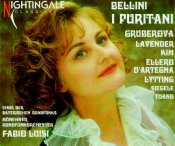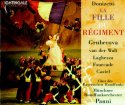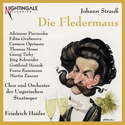
15 May 2006
Three Releases from Nightingale Classics
Frank Sinatra had Reprise. The Beatles had Apple. Madonna has Maverick. And Edita Gruberova has Nightingale.
The Sixteen continues its exploration of Henry Purcell’s Welcome Songs for Charles II. As with Robert King’s pioneering Purcell series begun over thirty years ago for Hyperion, Harry Christophers is recording two Welcome Songs per disc.
In February this year, Albanian soprano Ermonela Jaho made a highly lauded debut recital at Wigmore Hall - a concert which both celebrated Opera Rara’s 50th anniversary and honoured the career of the Italian soprano Rosina Storchio (1872-1945), the star of verismo who created the title roles in Leoncavallo’s La bohème and Zazà, Mascagni’s Lodoletta and Puccini’s Madama Butterfly.
Collapsology. Or, perhaps we should use the French word ‘Collapsologie’ because this is a transdisciplinary idea pretty much advocated by a series of French theorists - and apparently, mostly French theorists. It in essence focuses on the imminent collapse of modern society and all its layers - a series of escalating crises on a global scale: environmental, economic, geopolitical, governmental; the list is extensive.
Amongst an avalanche of new Mahler recordings appearing at the moment (Das Lied von der Erde seems to be the most favoured, with three) this 1991 Mahler Second from the 2nd Kassel MahlerFest is one of the more interesting releases.
If there is one myth, it seems believed by some people today, that probably needs shattering it is that post-war recordings or performances of Wagner operas were always of exceptional quality. This 1949 Hamburg Tristan und Isolde is one of those recordings - though quite who is to blame for its many problems takes quite some unearthing.
The voices of six women composers are celebrated by baritone Jeremy Huw Williams and soprano Yunah Lee on this characteristically ambitious and valuable release by Lontano Records Ltd (Lorelt).
As Paul Spicer, conductor of the Royal Birmingham Conservatoire Chamber Choir, observes, the worship of the Blessed Virgin Mary is as ‘old as Christianity itself’, and programmes devoted to settings of texts which venerate the Virgin Mary are commonplace.
Ethel Smyth’s last large-scale work, written in 1930 by the then 72-year-old composer who was increasingly afflicted and depressed by her worsening deafness, was The Prison – a ‘symphony’ for soprano and bass-baritone soloists, chorus and orchestra.
‘Hamilton Harty is Irish to the core, but he is not a musical nationalist.’
‘After silence, that which comes closest to expressing the inexpressible is music.’ Aldous Huxley’s words have inspired VOCES8’s new disc, After Silence, a ‘double album in four chapters’ which marks the ensemble’s 15th anniversary.
A song-cycle is a narrative, a journey, not necessarily literal or linear, but one which carries performer and listener through time and across an emotional terrain. Through complement and contrast, poetry and music crystallise diverse sentiments and somehow cohere variability into an aesthetic unity.
One of the nicest things about being lucky enough to enjoy opera, music and theatre, week in week out, in London’s fringe theatres, music conservatoires, and international concert halls and opera houses, is the opportunity to encounter striking performances by young talented musicians and then watch with pleasure as they fulfil those sparks of promise.
“It’s forbidden, and where’s the art in that?”
Dublin-born John F. Larchet (1884-1967) might well be described as the father of post-Independence Irish music, given the immense influenced that he had upon Irish musical life during the first half of the 20th century - as a composer, musician, administrator and teacher.
The English Civil War is raging. The daughter of a Puritan aristocrat has fallen in love with the son of a Royalist supporter of the House of Stuart. Will love triumph over political expediency and religious dogma?
Beethoven Symphony no 9 (the Choral Symphony) in D minor, Op. 125, and the Choral Fantasy in C minor, Op. 80 with soloist Kristian Bezuidenhout, Pablo Heras-Casado conducting the Freiburger Barockorchester, new from Harmonia Mundi.
A Louise Brooks look-a-like, in bobbed black wig and floor-sweeping leather trench-coat, cheeks purple-rouged and eyes shadowed in black, Barbara Hannigan issues taut gestures which elicit fire-cracker punch from the Mahler Chamber Orchestra.
‘Signor Piatti in a fantasia on themes from Beatrice di Tenda had also his triumph. Difficulties, declared to be insuperable, were vanquished by him with consummate skill and precision. He certainly is amazing, his tone magnificent, and his style excellent. His resources appear to be inexhaustible; and altogether for variety, it is the greatest specimen of violoncello playing that has been heard in this country.’
Baritone Roderick Williams seems to have been a pretty constant ‘companion’, on my laptop screen and through my stereo speakers, during the past few ‘lock-down’ months.
Melodramas can be a difficult genre for composers. Before Richard Strauss’s Enoch Arden the concept of the melodrama was its compact size – Weber’s Wolf’s Glen scene in Der Freischütz, Georg Benda’s Ariadne auf Naxos and Medea or even Leonore’s grave scene in Beethoven’s Fidelio.

Frank Sinatra had Reprise. The Beatles had Apple. Madonna has Maverick. And Edita Gruberova has Nightingale.
Yes, even classical artists can have labels which exist predominantly for the distribution of their own creative efforts.
For well over a decade Nightingale Classics recorded for posterity the voice of superstar (at least in Europe) Edita Gruberova, in complete sets of the operas with soprano roles which best display her amazing coloratura agility and crystalline high notes. Now a new distributor in the US seeks to bring renewed attention to these sets, and three will be considered here: I Puritani, La Fille du Regiment, and Die Fledermaus.
Fabio Luisi's career as a conductor has grown rapidly since he led this I Puritaniin 1994. His efforts here are compromised by rather distant sound and the proficient but not convincingly idiomatic reading of the Bellini score by the Munich Radio Orchestra (the ensemble for all three recordings discussed here). neither of the principal male leads offers anything distinctive. Justin Lavender manages the high notes for Lord Arturo, but not with much impact, and his tone throughout his range lacks beauty. Ettore Kim's Sir Riccardo has more personality, if not any more basic attractive vocal quality.
This set then truly serves as a showpiece for Gruberova, raising the question of whether a highlights CD might have been a better option. She has full command of the role's demands, and that plaintive aura in her middle range works well for Elvira, who spends most of the opera despondent, when not insane. A better cast overall can be heard on the recent DVD release (reviewed on OperaToday), and though Gruberova is fresher, obviously, on this recorded set, seeing her in the role does make a greater impression.
 Marie in La Fille du Regiment has
two sad-tinged arias as well, despite the comic setting, so Gruberova gets to
display most of finest attributes in this set, probably the best overall of
the three. The contribution of Deon van der Walt as Tonio must be respected
here; this role, currently a favorite for Juan-Diego Florez, requires a
charismatic tenor with reliable high Cs for this great "Mes Amis" aria, and
van der Walt delivers, if without Florez's greater tonal allure. The rest of
the cast and Marcello Panni's conducting all keep the fun feather-light.
Marie in La Fille du Regiment has
two sad-tinged arias as well, despite the comic setting, so Gruberova gets to
display most of finest attributes in this set, probably the best overall of
the three. The contribution of Deon van der Walt as Tonio must be respected
here; this role, currently a favorite for Juan-Diego Florez, requires a
charismatic tenor with reliable high Cs for this great "Mes Amis" aria, and
van der Walt delivers, if without Florez's greater tonal allure. The rest of
the cast and Marcello Panni's conducting all keep the fun feather-light.
 The best cast for any of these releases distinguishes the Die Fledermaus set. Gruberova 's classic
Adele supports Thomas Moser as Eisenstein and Adrienne Pieczonka as
Rosalinde. Friedrich Haider conducts capably. However, two mitigating factors
make a whole-hearted endorsement unlikely. First, once again, a DVD with
Gruberova is available, with an even finer cast: Wiekl, Popp, Fassbaender,
recorded in Vienna, and also reviewed here on OperaToday some time ago.
Second, some may object to all the dialogue being cut, while others may be
grateful. very few, one suspects, will be glad to have the third act comic
relief character of Frosch lead us through the opera's story with monologue
interludes, in German (of course). Translations are included in the libretto
(all these sets have good booklets, although the English translations of the
essays have an unintended comic quality).
The best cast for any of these releases distinguishes the Die Fledermaus set. Gruberova 's classic
Adele supports Thomas Moser as Eisenstein and Adrienne Pieczonka as
Rosalinde. Friedrich Haider conducts capably. However, two mitigating factors
make a whole-hearted endorsement unlikely. First, once again, a DVD with
Gruberova is available, with an even finer cast: Wiekl, Popp, Fassbaender,
recorded in Vienna, and also reviewed here on OperaToday some time ago.
Second, some may object to all the dialogue being cut, while others may be
grateful. very few, one suspects, will be glad to have the third act comic
relief character of Frosch lead us through the opera's story with monologue
interludes, in German (of course). Translations are included in the libretto
(all these sets have good booklets, although the English translations of the
essays have an unintended comic quality).
So for those who have a taste for Gruberova and an indifference, if not dislike, for DVDs, the Donizetti and Strauss sets can be recommended. Fans of the Bellini score should look for an alternative, with sopranos as great as Callas, Sutherland, and Sills all still available on disc.
Chris Mullins
Los Angeles Unified School District, Secondary Literacy